Search
Remove Ads
Advertisement
Search Results
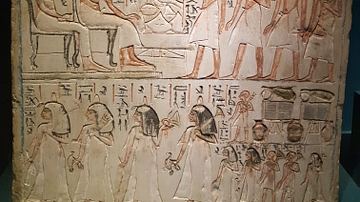
Image
Stela Of Qeh
Stela of Qeh, early 19th Dynasty, about 1250 BCE. Probably from Abydos, Egypt. The British Museum, (photo taken at The Powerhouse Museum, Sydney, Australia) Priests made offerings of food and drink to both the gods and the dead. Here...
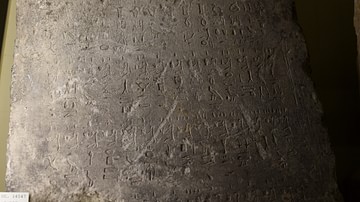
Image
Egyptian List of Offerings
Limestone slab with 14 columns of hieroglyphic inscriptions listing offerings The hieroglyphs on the slab edge read "revered before Anubis upon his mountain, he who is in the embalming-place". The slab dates back to the Old Kingdom of Egypt...
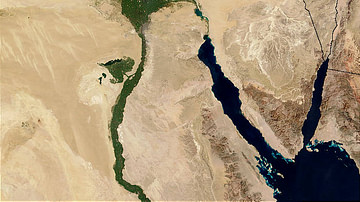
Definition
Nile
The world's longest river, located in Egypt, the Nile flows 4,132 miles (6,650 kilometres) northward to the Mediterranean Sea (a very unusual direction for a river to take). It was considered the source of life by the ancient Egyptians and...
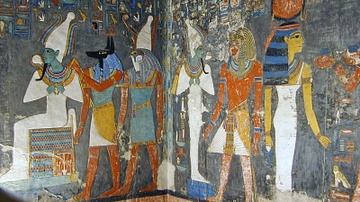
Image
Wall Painting from the Tomb of Horemheb
A wall painting from the tomb of Horemheb (r. 1320-1292 BCE). The figures depicted on the left-most wall, from left to right are Osiris, Anubis and Horus. The figures on the right-most wall are Osiris, Horemheb and Hathor. Valley of the Kings...
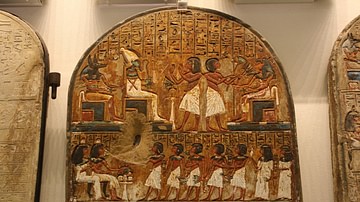
Image
Minhotep & Nakhtmin Relief Stele
A sandstone relief stele depicting in the top panel Minhotep and his son Nakhtmin making offerings to Hathor, Anubis, and Osiris. The middle panel shows Minhotep and his wife Nefertari. The bottom panel shows Nakhtmin and his wife Sekhmet...
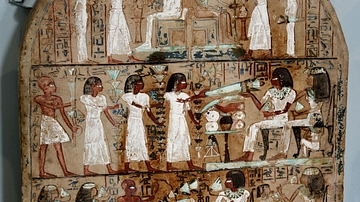
Image
Stela of Sobekhotep
Sobekhotep , the scribe of a wine-cellar, appears three times with his wife. In the mirroring scenes at the top, they worship the gods of Osiris (left in the form of a mummy) and Anubis (right, Jackal-headed). In the next scene, they are...
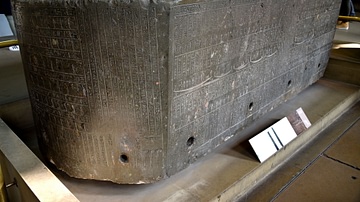
Image
Sarcophus of Nectanebo II
The sarcophagus was prepared for Egypt's last native pharaoh, Nectanebo II. Nectanebo's reign was cut short in the year 343 BCE, when the emperor Artaxerxes III restored Egypt to Persian rule. Nectanebo fled south, never to regain control...
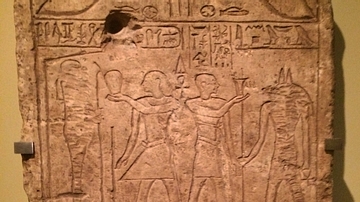
Image
Stela of King Seankhiptah of Egypt
Made of limestone and dating to the Second Intermediate Period (13th-14th Dynasties, c. 1785-1633 BCE), this ancient Egyptian stela is the primary source of information about Seankhiptah. On the left, the sovereign appears before the god...
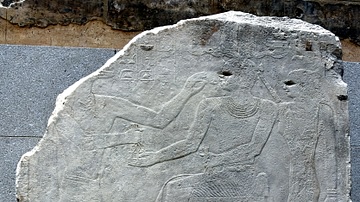
Image
Relief of Niuserre Ini from Abusir
The Egyptian pharaoh Niuserre Ini (Nyuserre Ini, Neuserre Ini) sits on a throne and receives life from Anubis. Old Kingdom, 5th Dynasty, second half of the 25th century BCE. From the mortuary temple of Niuserre at Abusir, Egypt. On display...
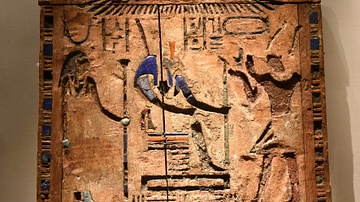
Image
Darius I as Pharaoh of Egypt
This wooden door shows Darius I (reigned 521-486 BCE) dressed as pharaoh on the right, making an offering to the Egyptian god Anubis. The goddess Isis stands on the left. The door originally belonged to a box (or naos) used to contain statuettes...